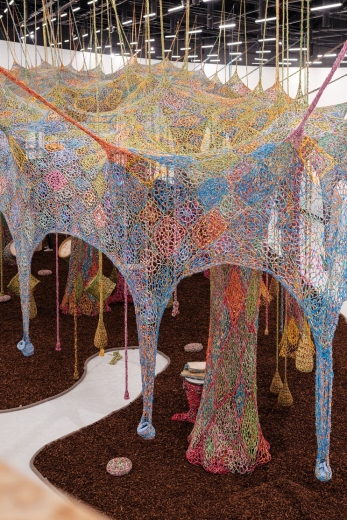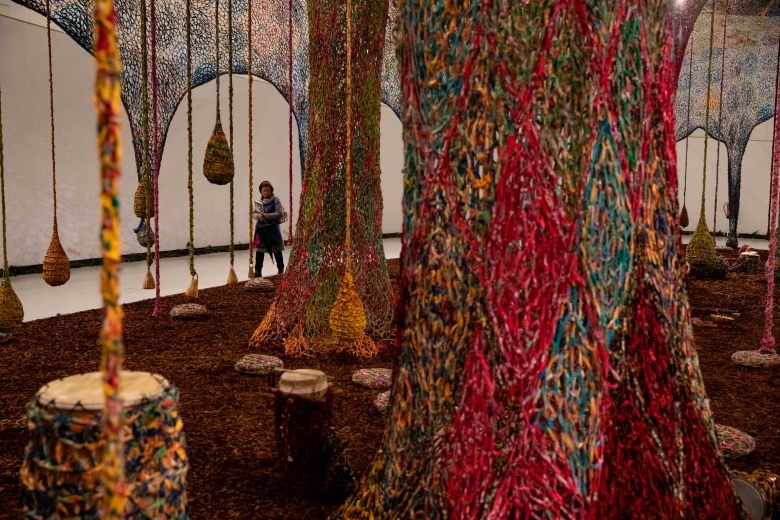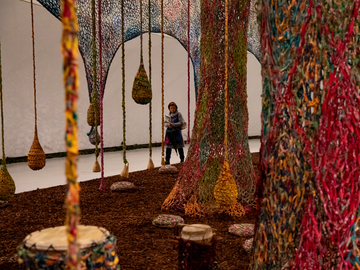
Reading is a central practice in Ernesto Neto's life and art. Each work has its mysteries, even for its author, and each artist will decipher and carry with them layers of access to the world, as revealed to varying degrees. Ernesto Neto's discourse and material are expansive and his work is realised on a large scale, as can be seen in the installation on display at MAAT: Nosso Barco Tambor Terra.
Among the countless references that form the basis of his broad artistic vocabulary, in his work Ernesto Neto displays his relationship with music, particularly percussion, and with the forms and organic materials of the earth, summoning senses that are usually dormant in museum spaces, such as smell and touch, and creating an imagined universe that takes us to an ancestral dimension and invites us to share a common territory. When speaking, Ernesto Neto makes constant references to his reading, often in an attempt to find a common understanding with the other. Reading and talking about the same books represent routes of access and encounter with the other, and with Ernesto Neto the relational aspect is paramount. When asked if he would like to tell us which books were the basis for the creation of Nosso Barco Tambor Terra, or for his creations in general, with the idea of a Reading Club in mind, the difficulty was to narrow his choices down to the essentials.
The Ernesto Neto Book Club thus represents an experience situated in an unconventional cartography, with the sessions taking place in the installation's exhibition space within the universe of readings selected by the artist. This Reading Club thus represents an opportunity for encounter, not so much to decipher each other's intimate mysteries, but in an attempt to animate a shared space.
Frequency: one session per month between June and September (except August), on Wednesdays in person at the Nosso Barco Tambor Terra installation.
Duration: 2h
Language: Portuguese
Price:
- €15 per session
- Free admission for MAAT Friends. Members with MAAT Friend +1 card can bring a companion for free. Applicable to all sessions. Become a MAAT Friend here.
Programme
1st. session: 05/06/2024, 19.00-21.00
With online presence of Ernesto Neto
Saving Beauty by Byung-Chul Han Learn more
2nd. session: 26/06/2024, 19.00-21.00
Ideas to Postpone the End of the World by Ailton Krenak Learn more
3ª session: 11/09/2024, 19.00-21.00 (session of 17/07 postponed to 11/09)
Caliban and the Witch by Silvia Federici Learn more
4ª sessão: 18/09/2024 das 19.00-21.00
The life of plants by Emanuele Coccia (Learn more)
Further reading recommended by Ernesto Neto:
The Archipelago Conversations by Hans Ulrich Obrist and Édouard Glissant Learn more
Entangled Life by Merlin Sheldrake Learn more
The Power of Myth by Joseph Campbell Learn more
The Dawn of Everything by David Graeber and David (Learn more)
Marta Lança biography
Lisbon (1976). Marta works as a freelancer in publishing, journalism, programming, and cinema. She has a degree in Literature and Portuguese Studies and is studying for a PhD in Artistic Studies at NOVA FCSH. She has collaborated with Portuguese and Angolan cultural publications. Exploring post-colonial issues, she created the magazines V_ludo, Dá Fala (in Cape Verde) and the portal BUALA, which she has been editing since 2010 and which was launched at the Terreiros programme of the São Paulo Biennial. She has lived in Rio de Janeiro and São Paulo, in Luanda (teaching at Agostinho Neto University and collaborating with the 1st Luanda Triennale), in Maputo (Dockanema documentary festival), and has produced many cultural projects in Portuguese-speaking African countries.
As a programmer she has organised Roça Língua (São Tomé and Principe, 2011 and 2022); the Paisagens Efémeras cycle (Lisbon, 2015); Expats (Porto, 2015); Vozes do Sul (Festival do Silêncio, Lisbon, 2017); the NAU project with Teatro Experimental do Porto (Porto, 2018); Para nós, por nós: African and Afro-diasporic cultural production in debate (Lisbon, 2018); and sou esparsa, e a liquidez maciça: Gestos de Liberdade (MAAT, Lisbon, 2020).
She has translated authors such as Asger Yorn, Achille Mbembe, and Felwine Saar from French into Portuguese.
You can read some of her articles here..

